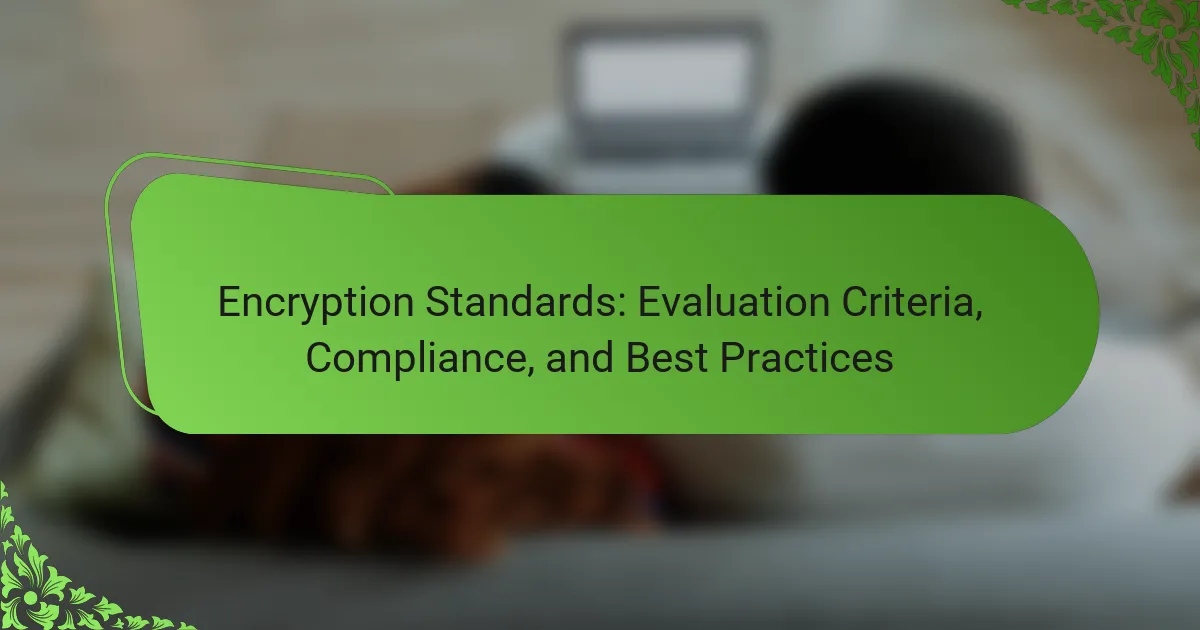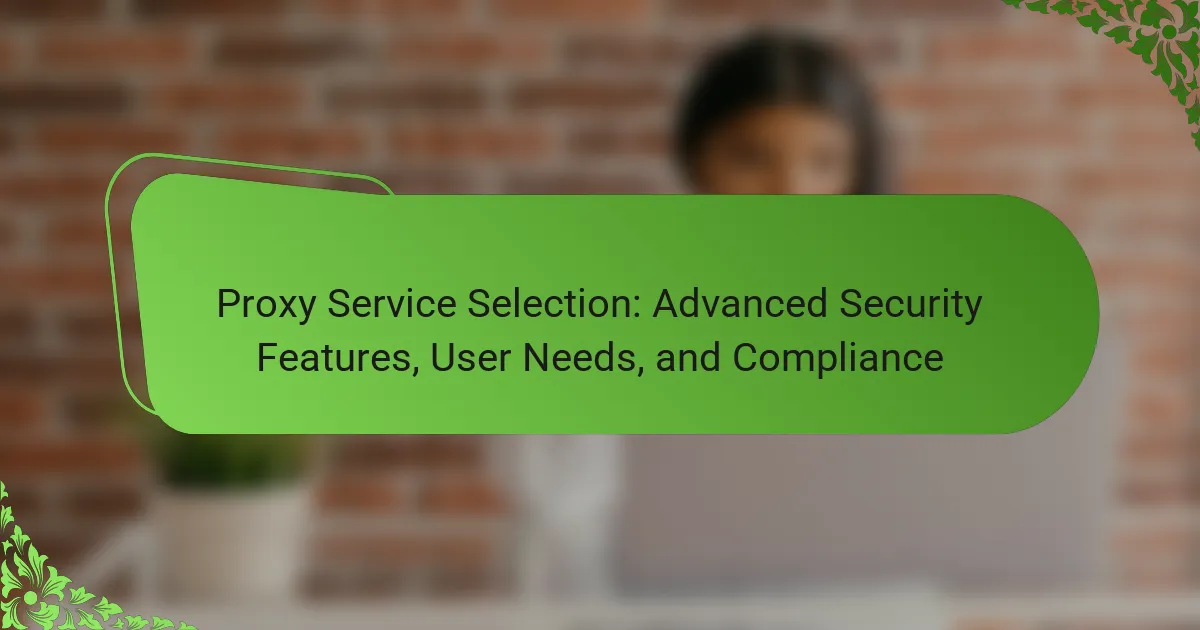No-log policies are essential for SaaS tools as they protect user privacy by ensuring that no data is stored or tracked. This commitment not only minimizes the risk of data breaches but also fosters user trust, as individuals can feel confident that their online activities remain confidential and secure. Compliance with regulations surrounding these policies further reinforces the importance of safeguarding personal information in today’s digital landscape.
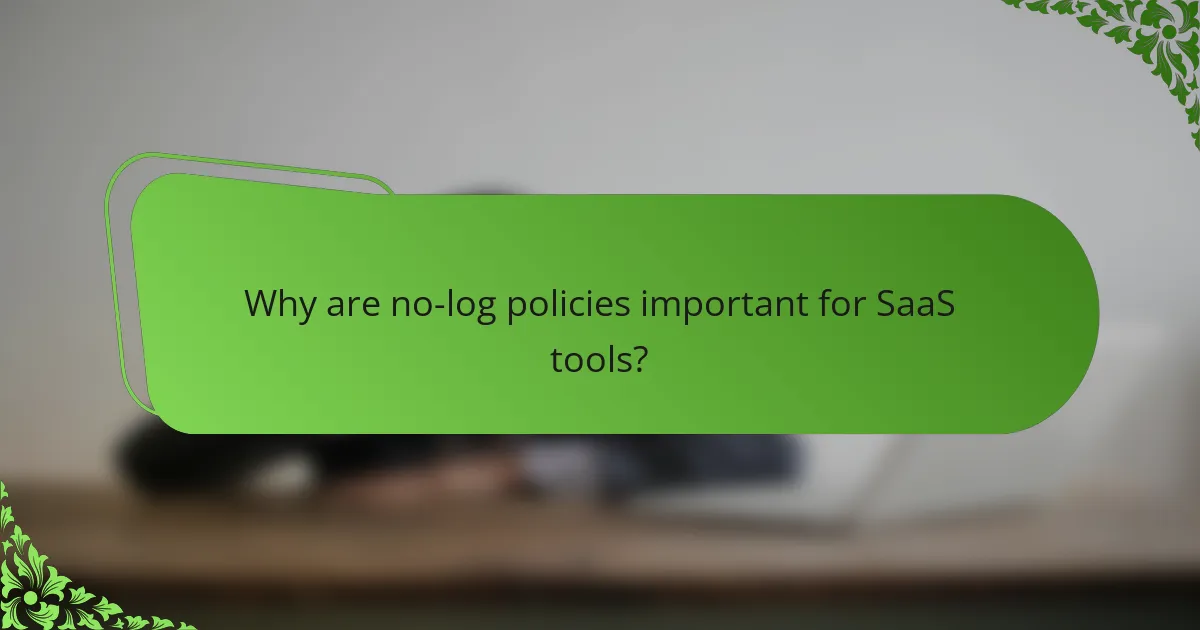
Why are no-log policies important for SaaS tools?
No-log policies are crucial for SaaS tools as they ensure that user data is not stored or tracked, enhancing privacy and security. By not retaining logs, providers minimize the risk of data breaches and unauthorized access, which is essential for maintaining user confidence.
User privacy protection
User privacy protection is a primary benefit of no-log policies. When a SaaS tool does not keep logs, it means that sensitive information about user activities is not recorded, reducing the potential for misuse. For example, if a service is hacked, the absence of logs means there is less data for attackers to exploit.
Moreover, no-log policies help users feel more secure, knowing that their online actions are not being monitored or stored. This is particularly important in sectors like finance or healthcare, where confidentiality is paramount.
Compliance with regulations
No-log policies can aid in compliance with various data protection regulations, such as the General Data Protection Regulation (GDPR) in Europe. These regulations often require companies to limit data collection and ensure user privacy, making no-log policies a strategic choice for compliance.
By adopting a no-log policy, SaaS providers can demonstrate their commitment to protecting user data, which can help avoid hefty fines and legal issues associated with non-compliance. This proactive approach can also simplify the auditing process, as there is less data to manage and protect.
Building user trust
Implementing a no-log policy is an effective way to build user trust. When users know that a service does not track or store their data, they are more likely to engage with the platform and share sensitive information. Trust is a critical factor in user retention and satisfaction.
To reinforce this trust, SaaS providers should be transparent about their no-log policies, clearly communicating how they protect user data. Regular audits and third-party certifications can further validate their commitment to privacy, enhancing credibility in a competitive market.
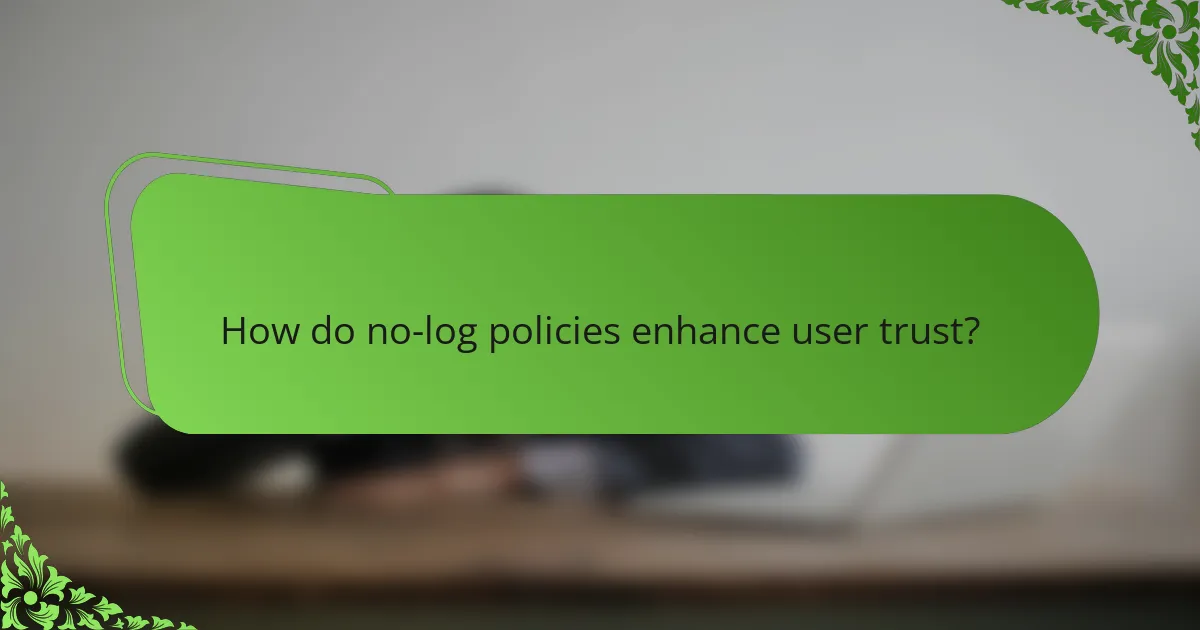
How do no-log policies enhance user trust?
No-log policies enhance user trust by ensuring that a service provider does not retain any logs of user activity. This commitment to privacy reassures users that their online actions remain confidential and are not subject to scrutiny or data breaches.
Transparency in data handling
Transparency in data handling is crucial for building trust. When a service provider clearly communicates its no-log policy, users can feel confident that their information is not being collected or stored. This openness can be reinforced through third-party audits or certifications that verify compliance with the stated policies.
For example, a VPN provider that publishes regular transparency reports detailing its data handling practices can enhance user confidence. Users should look for providers that openly share their policies and any changes made to them.
Accountability and security assurance
Accountability is key in maintaining user trust, especially when no-log policies are in place. Providers that adhere to these policies are less likely to face legal challenges related to data retention, which can lead to security vulnerabilities. This assurance helps users feel secure knowing their data is not at risk of exposure.
To ensure accountability, users should choose services that are willing to undergo independent audits and provide clear evidence of their no-log practices. Regular updates on security measures and compliance can further enhance trust in the service.
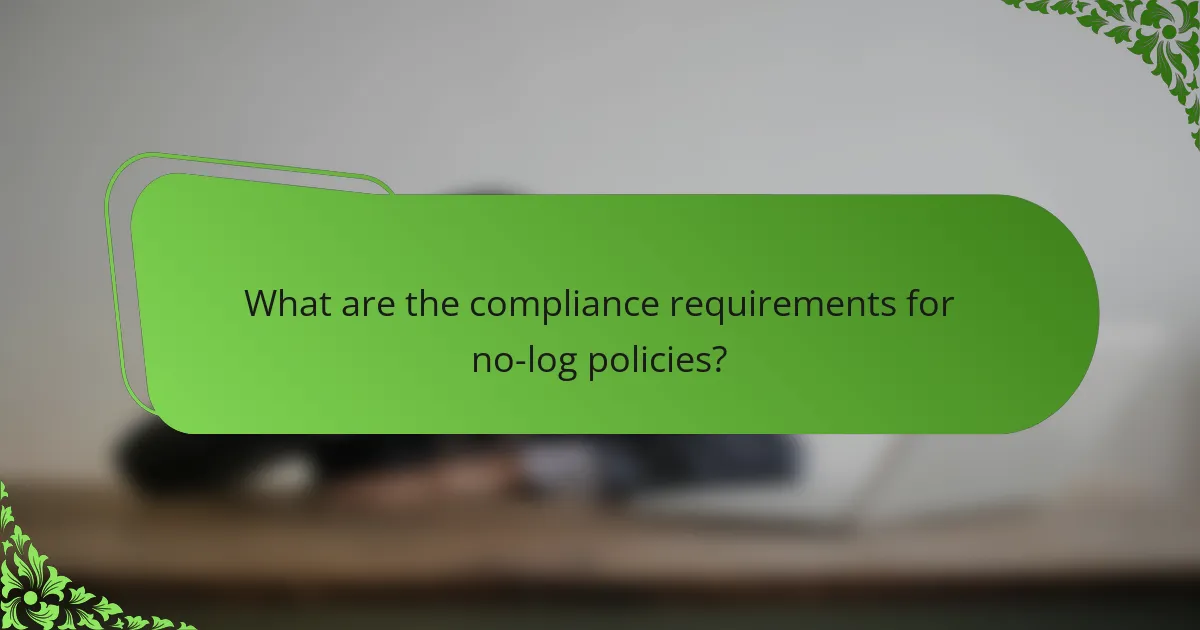
What are the compliance requirements for no-log policies?
No-log policies must comply with various regulations that protect user privacy and data security. These requirements ensure that service providers do not retain user activity logs, thus enhancing user trust and safeguarding personal information.
GDPR compliance
The General Data Protection Regulation (GDPR) mandates strict guidelines for data handling within the European Union. Under GDPR, companies must demonstrate transparency in their data processing activities, including the implementation of no-log policies to ensure that personal data is not stored or misused.
To comply with GDPR, organizations should conduct regular audits of their data practices, clearly communicate their no-log policies to users, and establish procedures for data access requests. Failure to comply can result in significant fines, often reaching up to 4% of annual global revenue.
CCPA adherence
The California Consumer Privacy Act (CCPA) provides California residents with rights regarding their personal information, including the right to know what data is collected and the right to delete it. A no-log policy aligns with CCPA by minimizing the retention of user data, thereby enhancing consumer privacy.
Businesses must inform users about their data collection practices and allow them to opt-out of data sales. Implementing a no-log policy can simplify compliance with CCPA by reducing the amount of data that needs to be managed and protected, ultimately fostering greater consumer trust.
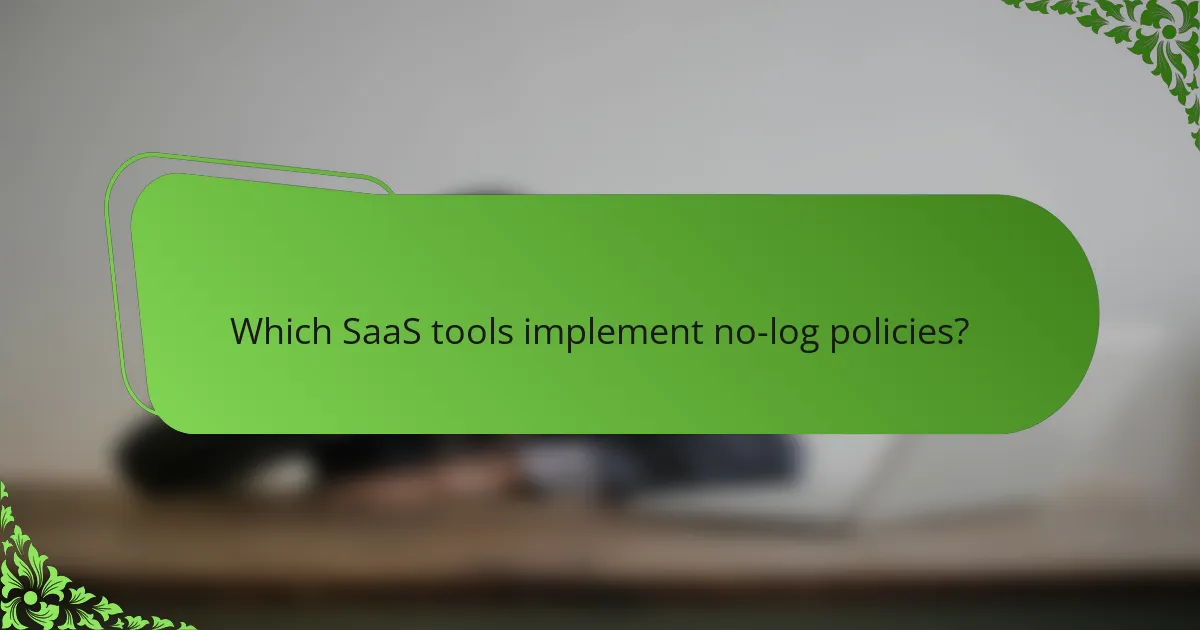
Which SaaS tools implement no-log policies?
Several SaaS tools prioritize user privacy by implementing no-log policies, ensuring that user data is not stored or tracked. This approach helps maintain user anonymity and builds trust, particularly in the realm of VPN services.
NordVPN
NordVPN is renowned for its strict no-log policy, which is independently audited to confirm compliance. This means that user activity is not recorded, providing a layer of privacy that is crucial for users concerned about data tracking.
Additionally, NordVPN employs advanced encryption standards and features like Double VPN, which routes traffic through multiple servers, further enhancing user security. Users can feel confident that their online activities remain private and untraceable.
ExpressVPN
ExpressVPN also adheres to a no-log policy, ensuring that no user data is stored on its servers. This commitment is backed by a third-party audit, reinforcing the company’s dedication to user privacy.
The service offers robust security features, including split tunneling and a kill switch, which help protect user data even in the event of a connection drop. Users can trust that their browsing history and personal information are not being logged or monitored.
Surfshark
Surfshark implements a no-log policy that is designed to protect user privacy by not retaining any connection or usage logs. This policy is crucial for users who prioritize anonymity while browsing the internet.
In addition to its no-log commitment, Surfshark offers features like CleanWeb, which blocks ads and trackers, enhancing the overall user experience. This combination of privacy and security makes Surfshark a strong choice for those seeking a reliable VPN service.
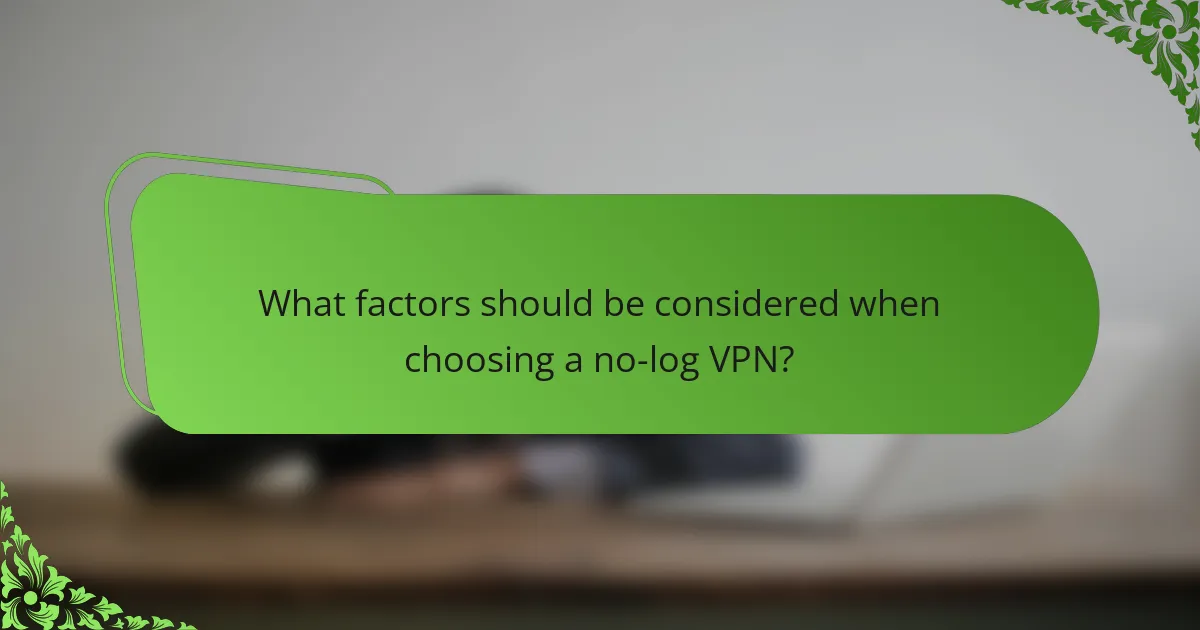
What factors should be considered when choosing a no-log VPN?
When selecting a no-log VPN, consider its reputation, encryption standards, and jurisdictional implications. These factors significantly impact the level of privacy and security you can expect from the service.
Reputation and reviews
Reputation plays a crucial role in determining the reliability of a no-log VPN. Look for services with positive reviews from reputable sources and user feedback on platforms like Trustpilot or Reddit. A VPN with a strong track record is more likely to uphold its no-log policy effectively.
Be cautious of services with numerous negative reviews or allegations of data logging. Transparency in operations and a history of independent audits can also enhance trust in a VPN’s no-log claims.
Encryption standards
Strong encryption standards are essential for protecting your data while using a no-log VPN. Look for services that utilize AES-256 encryption, which is considered highly secure. Additionally, protocols like OpenVPN and WireGuard offer robust security features.
Ensure the VPN provider clearly outlines their encryption methods and any additional security measures, such as kill switches or DNS leak protection, to safeguard your online activities.
Jurisdictional implications
The jurisdiction in which a VPN operates can significantly affect your privacy. VPNs based in countries with strong privacy laws, like Switzerland or Iceland, are generally more trustworthy. Conversely, services based in countries with mandatory data retention laws may be less reliable in maintaining a no-log policy.
Research the legal environment surrounding data privacy in the VPN’s home country. Understanding local regulations can help you assess the risks associated with potential data requests from authorities.
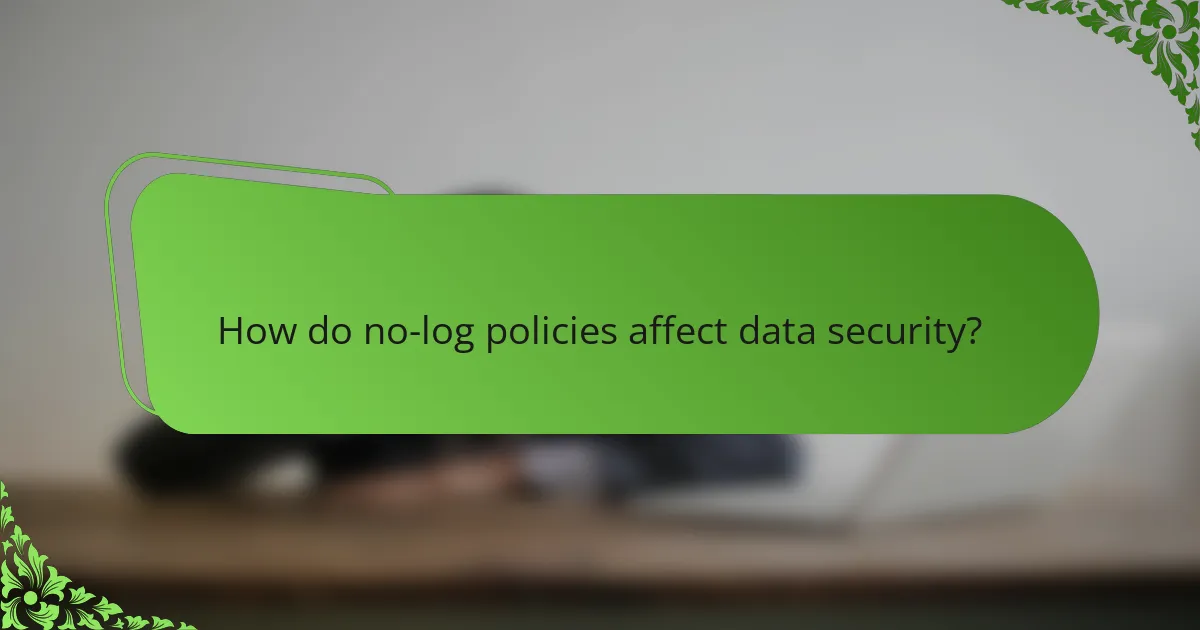
How do no-log policies affect data security?
No-log policies enhance data security by ensuring that user activity is not recorded or stored by service providers. This means that even in the event of a data breach, there is minimal risk of exposing user information, as no logs exist to be compromised.
Understanding no-log policies
No-log policies refer to the practice of not keeping records of user activity by VPNs or other online services. This approach is designed to protect user privacy by preventing the collection of data that could be used to identify individuals or track their online behavior.
By implementing a no-log policy, companies commit to not retaining any information that could be linked back to users. This includes connection timestamps, IP addresses, and browsing history. As a result, users can browse the internet with greater anonymity and security.
Benefits of no-log policies
No-log policies offer several key benefits for users concerned about privacy and data security. First, they significantly reduce the risk of personal data being exposed in the event of a cyberattack. Without logs, there is nothing for hackers to steal.
Additionally, these policies can enhance user trust. When users know that their online activities are not being tracked or recorded, they are more likely to feel secure using the service. This trust can lead to increased customer loyalty and satisfaction.
Compliance and regulations
Compliance with data protection regulations is crucial for companies that implement no-log policies. Many jurisdictions, including the European Union with its General Data Protection Regulation (GDPR), require organizations to protect user data and ensure transparency about data handling practices.
Companies must ensure their no-log policies align with these regulations, which often include stipulations about user consent and data processing. Failure to comply can result in significant fines and damage to reputation.
Choosing a provider with a no-log policy
When selecting a service provider, it’s essential to verify their no-log policy. Look for clear, written statements regarding what data is collected and retained. Providers should be transparent about their practices and willing to share their privacy policies.
Additionally, consider third-party audits or certifications that validate a provider’s claims about their no-log practices. This can provide an extra layer of assurance that the service is genuinely committed to user privacy.









